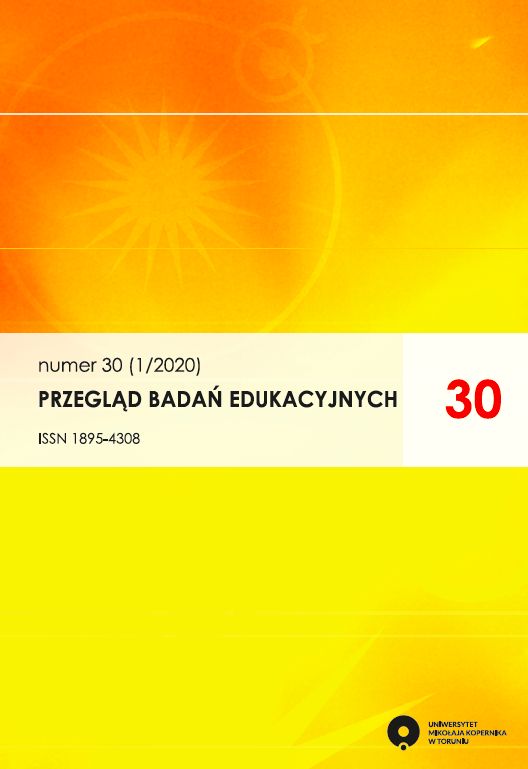In Search of School’s Sausative Power. Review of Research and Effective School Models
DOI:
https://doi.org/10.12775/PBE.2020.010Keywords
efficiency, school, effective school models, school developmentAbstract
The article has a format of a review. As such, it focuses on previous research and proposals for effective school models developed on its basis. It has been recognised that the category of school effectiveness is hardly present in Polish pedagogy, and its implications for research and improvement of school work are significant. Therefore, familiarisation with global achievements in this area is deemed valuable as a motivational and inspirational factor for scientific research among pedagogues who deal with school issues. For this purpose, a critical review of selected effective school models, which are important in the development of educational research focused on improving both the school and the school system, was carried out. The article justifies the change of approach that has been introduced into this area, as well as delineates perspectives for further research and exploration.
References
Ainscow, M., Dyson, A., Goldrick, S., & West, M. (2012). Making Schools Effective for All: Rethinking the Task. School Leadership & Management, 3(32), 197–213, doi: 10.1080/13632434.2012.669648.
Bernstein, B. (1968). Education Cannot Compensate for Society. New Society, 387, 344–347.
Coleman, J. S. (1966). Equality of Educational Opportunity. Washington D.C.: US Government Printing Office.
Creemers, B. P.M., Stoll, L., Reezigt, G., & ESI team (2007). Effective School Improvement – Ingredients for Success The Results of an International Comparative Study of Best Practice Case Studies. In: T. Townsend (Ed.), International Handbook of School Effectiveness and Improvement (pp. 825–838). Dordrecht: Springer.
Creemers, B.P.M., & Kyriakides, L. (2012). Improving Quality in Education: Dynamic Approachesto School Improvement. Routledge: New York.
Creemers, B., & Kyriakides, L. (2008). The Dynamics of Educational Effectiveness: A Contribution to Policy, Practice and Theory in Contemporary Schools. London and New York: Routlege.
Creemers, B.P.M., & Kyriakides, L. (2006). A Critical Analysis of the Current Approaches to Modelling Educational Effectiveness: The Importance of Establishing a Dynamic Model. School Effectiveness and School Improvement, 17, 347–366, doi: 10.1080/09243450600697242.
Creemers, B.P.M., Kyriakides, L., & Sammons, P. (2010). Methodological Advances in Educational Effectiveness Research. London and New York: Taylor & Francis.
Defining Effective Schools. In: The Nature of the Effective School, Routledge. Retrieved 10 December 2019 from http://cw.routledge.com/textbooks/9780415485586/data/chapters/08DefiningEffectiveSchools.pdf.
Desimone, L. (2002). How Can Comprehensive School Reform Models be Successfully Implemented? Review of Educational Research, 72(3), 433–479, doi: 10.3102%2F00346543072003433.
Edmonds, R. R. (1979). Effective Schools for the Urban Poor. Educational Leadership, 37(l), 15–27.
Edmonds, R. R. (1982). Programs of School Improvement: An Overview. Educational Leadership, 40(3), 4–11.
Fullan, M. (2010). All Systems Go: The Change Imperative for Whole System Reform. Thousand Oaks, CA: Corwin Press.
Harris, A., & Jones, M. (2010). Professional Learning Communities and System Improvement. Improving Schools, 2(13), 172–181, doi: 10.1177%2F1365480210376487.
Lezotte, L. (1991). Correlates of Effective Schools: The First and Second Generation. Okemos, MI: Effective Schools Products, Ltd.
Łukasik, J.M. (2016). W stronę nauczycielskiej „wspólnoty wrażliwej” na rozwój [In the Direction of Teacher’s „Community Sensitive” for Development]. In: A. Minczakiewicz, A. Szafrańska-Gajdzica, & M.J. Szymański (Eds.), Szkoła. Wspólnota dążeń? [School. Community of Aspirations?], (pp.101–113). Toruń: Adam Marszałek.
Mortimore, P. (1991). School Effectiveness Research: Which Way at the Crosssroads. School Effectiveness and School Improvement, 2(3), 213–229, doi: 10.1080/0924345910020304.
Nowosad, I. (2017). Rozwój i główne nurty w badaniach efektywności szkoły [Development and Main Trends in the Research of School Effectiveness]. Studia Edukacyjne, 46, 125–152, doi: 10.14746/se.2017.46.9.
Nowosad, I. (2018). Rozwój szkoły przez zmianę kultury szkoły [School Development by Changing the Culture of the School]. Problemy Profesjologii, 2, 13–23.
Nowosad, I. (2019). Kultura szkoły w rozwoju szkoły [School Culture in School Development]. Kraków: Oficyna Wydawnicza Impuls.
Purkey, S. C., & Smith, M. S. (1983). Effective Schools: A Review. Elementary School Journal, 83, 427–452, doi: 10.12691/education-5-7-2.
Reynolds, D. (1976). The Delinquent School. In: M. Hammersley, & P. Woods (Eds.), The Process of Schooling (pp. 217–219). London: Routledge and Kegan Paul.
Reynolds, D. (1995). The Effective School: an Inaugural Lecture. Evaluation and Research in Education, 9 (2), 57–73.
Reynolds, D., Creemers, B., Stringfield, S., Teddlie, C., & Schaffer, E. (Eds.) (2002). World Class Schools: International Perspectives on School Effectiveness. London: Routledge/ Falmer.
Reynolds, D., Sammons, P., Fraine, B., Van Damme, J., Townsend, T., Teddlie, Ch., & Stringfield, S. (2014). Educational Effectiveness Research (EER): a State-ofthe-art Review. School Effectiveness and School Improvement, 25, 197–230, doi: 10.1080/09243453.2014.885450.
Reynolds, D., Sammons, P., Stoll, L., Barber, M., & Hillman, J. (1996). School Effectiveness and School Improvement in the United Kingdom. School Effectiveness and School Improvement, 7, 2, 133–158, doi: 10.1080/0924345960070203.
Rubacha, K. (2008). Metodologia badan nad edukacją [Methodology of Educational Research]. Warszawa: Wydawnictwa Akademickie i Profesjonalne.
Rutter, M., Maughan, B., Mortimore, P., & Ouston, J. (1979). Fifteen Thousand Hours. London: Open Books.
Sammons, P. (1994). Findings from School Effectiveness Research: Some Implications for Improving the Quality of Schools. In: P. Ribbins, & E. Burridge (Eds), Improving Education: the Issue in Quality. London: Cassell.
Scheerens, J. (1992). Effective Schooling. London: Cassell.
Scheerens, J. (1997). Conceptual Models and Theory-Embedded Principles on Effective Schooling. School Effectiveness and School Improvement, 3 (8), 269–310, doi: 10.1080/09243453.2012.691100.
Scheerens, J. (2015). Educational Effectiveness and Ineffectiveness: A Critical Review of the Knowledge Base. Dordrecht, Heidelberg, New York, London: Springer,
Smith, D. J., & Tomlinson, S. (1989) The School Effect: A Study of Multi-Racial Comprehensives. London: Policy Studies Institute.
Weber, G. (1971). Inter-City Children Can Be Taught to Read: Four Successful Schools. Washington DC: Council for Basic Education.
Weindling, D. (1989). The Process of School Improvement: Some Practical Messages from Research. School Organisation, 9(1), doi: 10.1080/0260136890090105.
Downloads
Published
How to Cite
Issue
Section
Stats
Number of views and downloads: 721
Number of citations: 0



